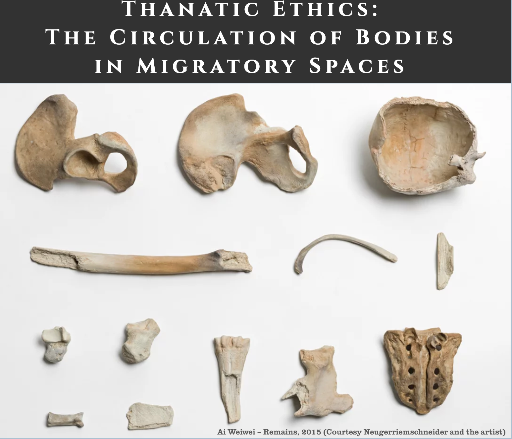
Thanatic Ethics: The Circulation of Bodies in Migratory Spaces
International Conference
Bodies on the Edge: Life and Death in Migration
Venue: Maison Française of Oxford, Oxford, UK
Dates: April 28 to 30, 2022
Language: English
Deadline for submitting proposals: 15 December 2021
Notification of acceptance: 15 January 2022
This conference will be held in person and participants will be expected to travel to Oxford at their own cost.
Full description of the Thanatic Ethics Project : https://www.thanaticethics.com
Project co-convenors:
Dr Bidisha Banerjee, Centre for Popular Culture in the Humanities, the Education U. of Hong Kong
Dr Thomas Lacroix, Sciences Po-CERI / Maison Française d’Oxford
Dr Judith Misrahi-Barak, EMMA, Université Paul-Valéry Montpellier 3, France
Organisation Committee:
Dr. Justine Feyereisen, Ghent University/Maison Française d’Oxford
Dr. Marie Godin, COMPAS-RSC, U. of Oxford
Dr. Alessandro Corso, ODID, U. of Oxford
Prof. Judith Rainhorn, Maison Française d’Oxford
Constantly surveilled yet paradoxically unseen, the bodies of dead migrants follow the tracks of the living on migratory routes. On their perilous journey to foreign lands, migrants come close to death or encounter it. Once settled, some of them yearn to be buried with their ancestors in their homeland, a few prefer the soil where their children grew up. The Thanatic Ethics project explores the social implications and aesthetic representations of the circulation of bodies in migratory spaces. After a series of Webinars and two Workshops (October 2020 to September 2021), the Oxford Thanatic Ethics conference seeks to address the liminalities of life and death in migratory spaces.
While recurring images of mass arrivals have fostered representations of migrants as disposable subhumans, selective migration policies blur the limits between the living and the dead. In 2011, the left-to-die-boat (Heller, Pezzani, Studio 2012) drifting for 14 days under the constant scrutiny of coast guards and war boats, exemplifies the necropolitics of migration management (Mbembe 2019) that distinguishes between those who live and deserve to remain alive, and those who don’t. These deaths are no longer just deaths in migration but “deaths of migration” (Babels 2017, Kobelinsky 2017), i.e. deaths that are a product of violent migration policies. The becoming-dead of migrants, or the humanitarian spectacle following migrant deaths at sea (Tazzioli and Stierl 2021), is also a policy tool: it is used as a deterring argument in anti-emigration campaigns in sending areas or as a justification for so called ‘anti-smuggling policies’ and border control that cause systematic human rights violations. Treating migrants as vulnerable subjects to be protected, migration policies are increasingly imbued with the rhetoric of humanitarian reason (Fassin 2011). The protection of the migrant body has ironically become a tool for confinement, bordering.
Death is not the end as the presence of those who passed away continue to haunt the existence of the living. Their absence and the emptiness they have left, imbue the social ties of those who mourn them. Body repatriation and associated migratory rituals are a way of filling this void. But what if the body has never been found? What if it has been lost in the depth of seas or in the midst of deserts? “Unritual” (Loichot 2020) art as well as online and offline acts of mourning have flourished so that those lost would not fall into oblivion: multivarious art performance, art exhibitions and literary production, but also memorials and public events set up by families of missing migrants, diasporic communities, as well as pro-migrant organisations, attempt to make the disappearance of migrants visible to the public.
Circulating bodies become part and parcel of their biosphere, enmeshed in an organic and inorganic continuum with other living organisms, a wider relational cosmology of life forms (Kodjo-Granvaux 2021), from the smallest viruses (COVID 19) to complex plants and animals, but also material objects and raw matter. This is not only the case for migrants’ bodies but also for migrating bodies, their commodified body parts circulating on the market for organ trafficking.
From the becoming-dead of the living on migration routes and in (necro-) policies, to the ongoing traces left by the dead among the living, this conference addresses the manifold liminalities between what is alive and what is not, in all its materiality and immateriality.
We welcome contributions from the Humanities, Social Sciences and related disciplines (multi and transdisciplinary perspectives will be favoured) on the following themes (though not exclusively):
· Methodologies addressing the relation between life and death: life writing, digital humanities, migration death databases, etc.;
· Policy narratives and measures of migrant death in anti-emigration campaigns and migrant death counting;
· The humanitarian reason and migrant vulnerability in migration management;
· Necropolitical ecologies : the relation between migrants and their environment on migration routes;
· International organ trafficking; the integrity of the human body, dead or alive;
. Liminalities between organic and non-organic matter, human and non-human;
· Contemporary rituality (body repatriation, burial committees), its economics, its administration and politics (insurance schemes, debts to be paid, death certificate to be issued etc.);
· Contemporary unrituality: collective, militant and artistic projects meant to dignify the disappearance of those left with no trace;
. Spectrality: ghosts, spectres and zombification in the postcolonial perspective on migration;
. Living-dead identities: usurpation of the identities of the dead.
. Migrant deaths in times of Covid-19: Migrants have been over-represented in Covid-19 hospitalisations and deaths; at the same time, migrants have also been portrayed as threats (as ‘corona spreaders’) potentially causing the death of ‘others’. How are colonial legacies being reproduced with the bodies, lives and deaths of migrants within and outside the borders?
We invite contributors to send their proposals (a 250-word abstract, title, author’s name, a 150-word bio, and contact information) to the conference email address: thanaticethics@gmail.com.
Each presentation should be 20 minutes (followed by discussion time). A selection of papers will be considered for publication.